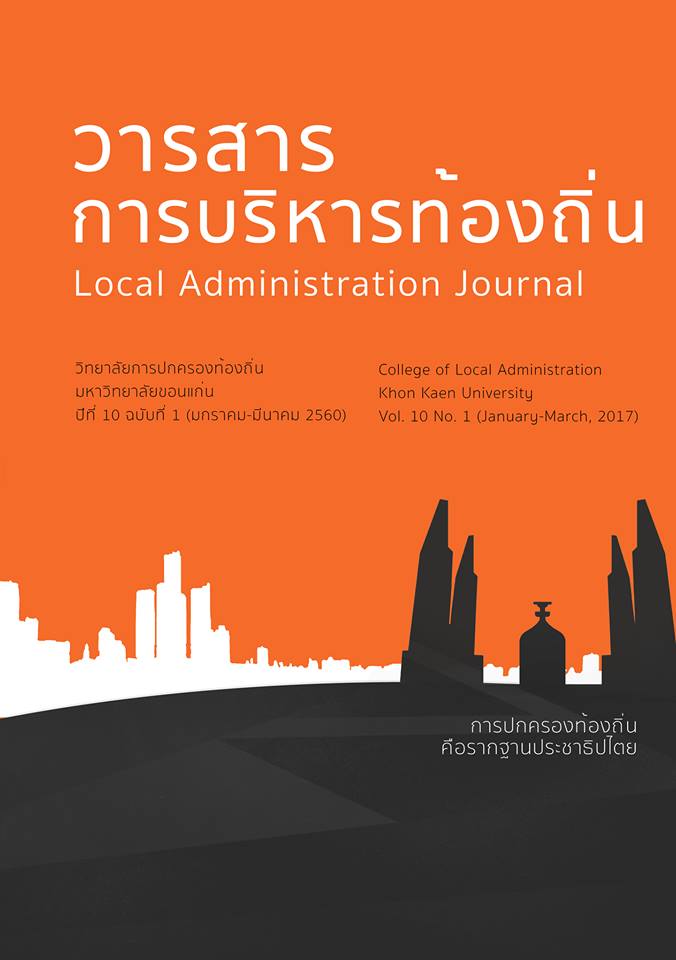ธรรมนูญลุ่มน้ำภูมี: ประชาธิปไตยฐานรากกับการจัดการทรัพยากรธรรมชาติและสิ่งแวดล้อม
Keywords:
ธรรมนูญลุ่มน้ำภูมี, ประชาธิปไตยฐานราก, การจัดการทรัพยากรธรรมชาติและสิ่งแวดล้อม, Phumi Watershed Charter, Grassroots Democracy, Management of Natural Resource and EnvironmentAbstract
การศึกษานี้มีวัตถุประสงค์เพื่อศึกษาพัฒนาการและการก่อตัวขององค์กรชุมชนและการขับเคลื่อนแบบมีส่วนร่วมผ่านธรรมนูญลุ่มน้ำภูมี และผลการนำธรรมนูญลุ่มน้ำภูมีไปปฏิบัติใช้ โดยใช้ระเบียบวิธีวิจัยเชิงคุณภาพ (Qualitative Research) จากการศึกษาข้อมูลเอกสารงานวิจัยที่เกี่ยวข้อง และการเก็บข้อมูลภาคสนาม จากการสัมภาษณ์ การสังเกตการณ์ และการสนทนากลุ่ม
ผลการศึกษาพบว่า พัฒนาการและการก่อตัวขององค์กรชุมชนและการขับเคลื่อนแบบมีส่วนร่วม ผ่านธรรมนูญลุ่มน้ำภูมี เป็นผลการพัฒนาจากการพัฒนาที่ไม่สมดุล ทำให้ทรัพยากรธรรมชาติลุ่มน้ำและ เสื่อมโทรมลง และส่งผลกระทบต่อคุณภาพชีวิตของประชาชน จึงเกิดการรวมตัวเป็นเครือข่ายอนุรักษ์และพัฒนาลุ่มน้ำรัตภูมี โดยมีธรรมนูญลุ่มน้ำภูมีเป็นกลไกและเครื่องมือในการจัดการทรัพยากรธรรมชาติและสิ่งแวดล้อม ผลของการใช้ธรรมนูญลุ่มน้ำภูมีไปปฏิบัติการ ทำให้เกิดการเปลี่ยนแปลงในด้านเศรษฐกิจ สังคม ทรัพยากรธรรมชาติและสิ่งแวดล้อม อย่างไรก็ตามธรรมนูญลุ่มน้ำภูมี ไม่ได้มีผลโดยตรงต่อทางกฎหมาย จึงต้อง มีการรณรงค์ส่งเสริมการตระหนักรู้อย่างต่อเนื่องเพื่อให้ธรรมนูญลุ่มน้ำภูมีเป็นเครื่องมือสำคัญในการสร้างพลังทางสังคม และการอนุรักษ์ฟื้นฟูทรัพยากรให้ให้ยั่งยืน
Phumi Watershed Charter: Grassroots Democracy and the Management of Natural Resource and Environment
The objective of this study was to investigate the formation and establishment of the community organizations and their participatory community movement through Phumi Watershed Charter, as well as the result of Phumi Watershed Charter implementation. A qualitative research approach was used and data were collected by means of document analysis and field work data that included observations, in-depth interviews, and focus group interviews.
The results of this study indicate that the development and establishment of participatory community movement through the Phumi Watershed Charter were due to an unbalanced development that caused degradation of natural resources and effected the quality of life of citizens. Findings also indicate that such results led to the establishment of the Rattaphum Watershed Conservation and Development Network that uses the Phumi Watershed Charter as a mechanism for managing natural resources and environment. The implementation of the Charter has resulted in positive changes in the economic, social, and environmental resources. However, the Charter is not law-abiding. Therefore, there need to be campaigns that promote awareness and advocacy of the importance of the Charter as a powerful tool for social empowerment and sustainable conservation.
Downloads
Published
How to Cite
Issue
Section
License
The copyright of all articles published in the Local Administration Journalis owned by the College of Local Administration, Khon Kaen University.



